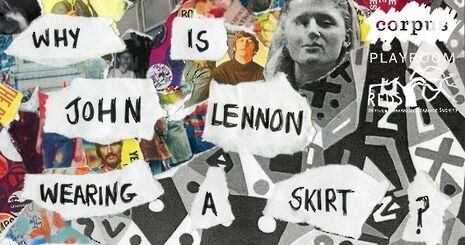Review: Why is John Lennon Wearing a Skirt?
“Profoundly-touching and thought-provoking” writes Anna Shmatenko of Rosanna Suppa’s performance of Why is John Lennon Wearing a Skirt?

Every time I go to the theatre to see a one-actor performance, I’m always a bit sceptical – for some reason, it always seems to me that it should take at least two to be able to summon and tame that beast that is the magic of the stage. So far, however, I’ve been extremely fortunate in coming across only excellent, ‘hand-picked’ quality monologues, that always fill me with wonder at how successful this style can be if executed correctly.
But this was something else entirely. This wasn’t a monologue at all – it was a spectacle of dozens of interactions between different people with distinct personalities who collectively unravelled, before our very eyes, and the life-story of the main character, played by Rosanna Suppa. And I mean, all of them played by Rosanna Suppa.
When Suppa’s magnificent acting skills came in contact with Rebecca Vaa’s careful directing instruction, it was as though a sparkler was suddenly ignited and we were all there to witness the brilliant dance of its sizzling glow – at least, that’s the best metaphor that I can come up with to describe the dazzling, radiating energy of Suppa’s brilliant performance. Single-handedly, she populated the stage with a diverse cast of numerous characters, each one alive and breathing and almost palpable. She was able to leave that rare impression when, upon leaving the theatre, I was not quite sure how much of it took place on stage and how much in my own imagination, assisted by the vividness of her impersonations.
“Suppa’s inexhaustible energy gifted her with a wondrous ability to teleport around the stage”
Suppa’s inexhaustible energy gifted her with a wondrous ability to teleport around the stage; one moment she’s jumping off a chair, the other she’s dancing on the other side of the stage and then – unexpectedly – she’s shaking my hand, for I am now also a character in the story. And since we are also a part of this boisterous entertaining interactive laugh-out-loud fun now, Suppa has a full right to shower us with popcorn and bombard us with discarded items of clothing, which she really doesn’t miss a chance to do – so when you go to see the show, try to watch your head!
If you expect anything by just reading the title, it is the good songs of the 60’s and the 70’s – and Why is John Lennon Wearing a Skirt? has plenty of it to offer, played to set the scene and, at times, even sung. The set is more on the minimalistic side, with posters of the Beatles and the Rolling Stones adorning the empty walls and a table and a chair placed close to the centre of the stage. However, it is the atmospheric lighting that functions as the set, more than the set itself. The lighting takes us to various places, be they physical destinations or projections in the central character’s mind, with its alteration between the warm bright wash and the sudden dim shaft, and the that it way it mixes colours to paint the stage in desirable hues is a masterpiece in its own right.
What is especially impressive about the set, however, is its incorporation of costumes, which are lined up against the walls, and all of which Suppa gets to wear at this or that point in the story. The different stages of the central character’s life are punctuated by her outfits, effectively reminding the hysterically roaring audience every now and again about the more serious, coming-of-age aspect of the piece.
Let’s get a few things straight. This piece is indeed a side-splitting comedy, which will get you, like it got me, laughing almost non-stop. But be prepared to be slammed by concrete reality, with its generous stock of shock and sadness that will sometimes get you mid-laughter and wipe all the cheerfulness out of you. This piece is a profoundly touching and thought-provoking statement about gender stereotyping, and although the central problem has a ‘last generation’ feel to it, and may be slightly outdated for the modern audience, some parts of it, especially those that relate to our common past, are still scarily recognisable.
I would advise to go into the theatre with an open mind and to be sensitive to the dark aspects of the recent past that are being shown to us: if it’s something that we no longer have to suffer (or at least, not as much), it’s because the previous generation took care of the problem, so that we can live in a better and more accepting world
 News / Uni Scout and Guide Club affirms trans inclusion 12 December 2025
News / Uni Scout and Guide Club affirms trans inclusion 12 December 2025 News / Cambridge Vet School gets lifeline year to stay accredited28 November 2025
News / Cambridge Vet School gets lifeline year to stay accredited28 November 2025 News / Cambridge study finds students learn better with notes than AI13 December 2025
News / Cambridge study finds students learn better with notes than AI13 December 2025 Science / Did your ex trip on King’s Parade? The science behind the ‘ick’12 December 2025
Science / Did your ex trip on King’s Parade? The science behind the ‘ick’12 December 2025 News / Pembroke to convert listed office building into accom9 December 2025
News / Pembroke to convert listed office building into accom9 December 2025







